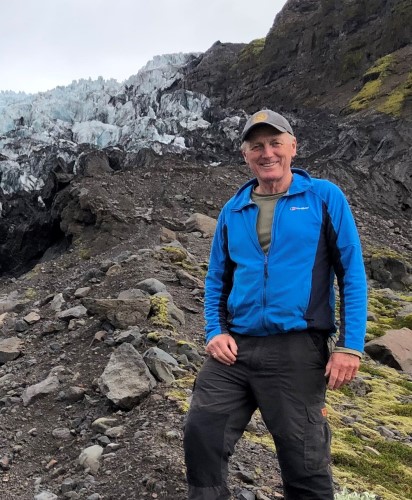Professor David Evans receives the Clough Medal of the Edinburgh Geological Society

Tell us about your work
I am a glacial geomorphologist, or someone who studies the impacts of glaciers and glaciation on the landscape. In order to do this convincingly it is important to conduct my research where modern glaciers exist today and understand how various glacial processes work and what they create in the landscape. From that crucial foundation I can then move on to interpreting the landforms and sediments of ancient glaciations such as those that impacted on Britain.
Congratulations on being awarded the medal. What does this award mean to you?
The citation for the Clough Medal of the Edinburgh Geological Society reads:
“…in recognition of your outstanding contribution to the understanding of the Quaternary geology of Scotland and Northern England, and especially innovative work on glacial geomorphology which has provided a highly regarded evidence base on which many international researchers have drawn. The award is in recognition of novel research, inspiration of future glacial scientists, and great dedication in advancing and communicating glacial geomorphology.”
I am delighted to be the recipient of this medal because it acknowledges a long period of intensive work I have conducted on the glacial history of northern England and Scotland as well as my efforts to educate and enthuse younger researchers. It also reflects the contribution of my work completed during the early part of my career in the Department of Geography at the University of Glasgow in the 1990s. It is especially nice as a geographer to get such an acknowledgement from a geological society – indeed I am only the fourth non-geologist to receive the Clough Medal since its inauguration in 1934.
Why are you so passionate about your area of research?
Glacial geomorphology has been a passion of mine since I was at school. I had developed a keen interest in geomorphology generally while doing my A levels and that interest was further focussed on glacial themes when I was an undergraduate. This academic interest has synergy with my love of the outdoors, especially mountain and polar environments and so I have never really considered my job as a job – more being paid to be an enthusiast.
How did you get into your area of research?
See above – it all started with the school A level text book “Principles of Physical Geography” by F.J. Monkhouse, which I loved perusing and highlighting places I wanted to visit. From this came a plan to walk the Pennine Way in 1978 – from there on my academic interests were always in synch with my enthusiasm for the outdoors and a passion for finding out how landscapes evolve.
How does your research influence the way you teach Geography students?
I have always championed research-led teaching and fieldwork and hence my modules tend to be focussed on field skills and researching glacial problems. Additionally, in order to understand glacial geomorphology you have to know a lot about how real glaciers work and hence I have always taken student groups to glacierized landscapes, especially those of Iceland.
Tell us about a day in the life of a Professor in the Department of Geography
As I’m writing this I am “in the field” in Iceland. A day undertaking research in Iceland involves packing up my field equipment and food and driving my Land Rover along rough tracks to the rapidly receding glacier snouts to study the landforms that are evolving in front of my eyes. After a day of data collection with colleagues from Poland and Iceland I return to my cabin to process and analyse data while preparing my evening meal. More often than not, the evening ends with a glass of whiskey, and if we’re lucky a heavenly display of the Northern Lights.
Find out more
- We are a world-leading centre of geographic education, ranked 15th in the QS World University Rankings by Subject 2022. Feeling inspired? Visit our undergraduate and postgraduate webpages to find out more about studying with us.
- Visit our Department of Geography webpages to learn more about our award-winning colleagues.
- If you would like to find out more about Professor David Evans and his work, visit his profile.
- Find out more about the Clough Medal of the Edinburgh Geological Society
- If you’d like to share your story or insights into your work, visit our Submit a blog or vlog page to learn more.
